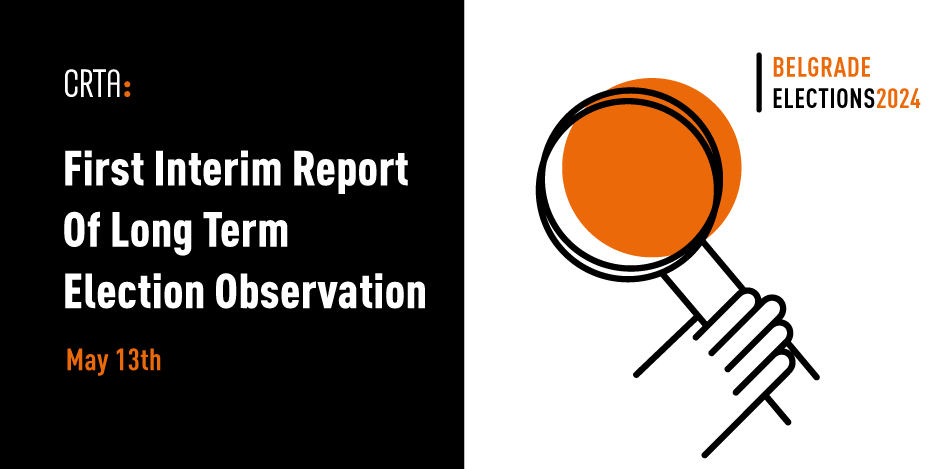Belgrade elections – “National” themes dominate, conditions mainly unchanged

The first part of the campaign was marked by the previously established erasure of the boundary between the state and the ruling party, as well as divisions among former allies from the pro-European opposition bloc regarding the question of a boycott. These observations are highlighted in today’s First interim report of long term election observation conducted by CRTA’s Observation Mission, which is monitoring the Belgrade city assembly elections.
The preliminary report underscores that the elections set for June 2 must be understood in the context of the significant compromise of the December voting process due to illegal and illegitimate electoral manipulation, such as mass voter migrations and tampering with the voter registry. These upcoming elections thus represent a continuation of the electoral proceedings that began in December 2023, yet they proceed without adhering to ODIHR’s priority recommendation for an independent audit of the voter registry.
Moreover, the period following the December elections has been filled with new doubts about the state of the voter registry, primarily triggered by contradictory information provided by the Ministry of Public Administration and Local Self-Government.
There is legitimate doubt surrounding the candidacy process. As of May 11, eight electoral lists had been unveiled, and of the 43 thousand signatures endorsing candidacies, three-quarters were authenticated by municipal authorities rather than notaries public. This fact is concerning as previous cases of signature falsification in elections were mostly associated with municipal offices. Further suspicion is deepened by the revelation that for some declared lists, which exclusively had their signatures certified by municipalities, only came to public attention upon the submission of their candidacies.
Despite being local elections, topics significant to the local communities are overshadowed by so-called existential national issues emphasized by the ruling majority, who are also manipulating state symbols, resources, and functions for the purpose of the campaign.
CRTA observers have also noted increased pressures on public sector employees, who are forced to commute from other cities to Belgrade during working hours to participate in activities of the ruling party.
The trend of extremely unequal representation of political actors in the media continues – representatives of the ruling party occupy 91 percent of airtime in prime-time news on nationally broadcasted television channels, with rare appearances and mentions of the opposition mostly portrayed in a negative light. President Aleksandar Vučić remains a central figure in both the media and the campaign of the Serbian Progressive Party.
Regarding the dialogue on electoral conditions being conducted under the auspices of the National Assembly, it is unclear whether the solutions that emerge will also apply to the elections on June 2. The ongoing discussions could be a promise for the future, or perhaps just a smokescreen concealing the fact that relevant institutions have done nothing to establish accountability for violations of the law in previous electoral cycles.
Find report summary in English here.








